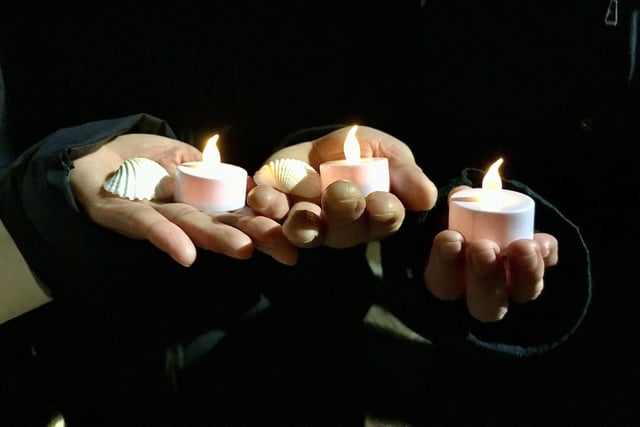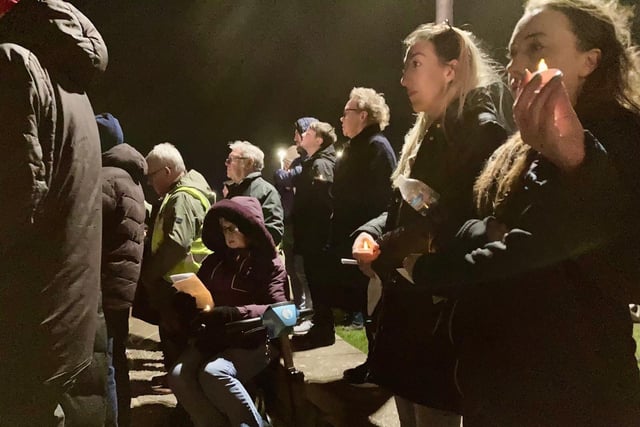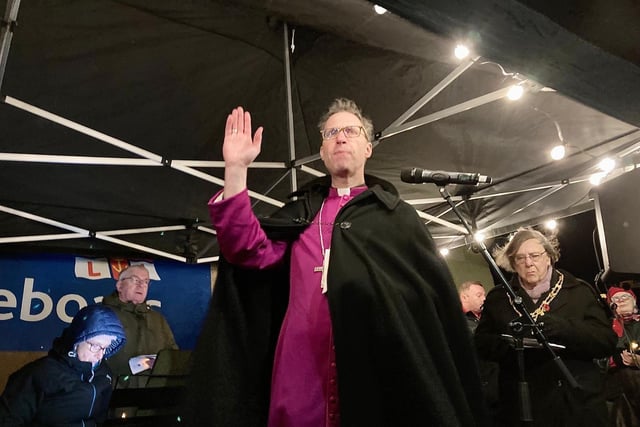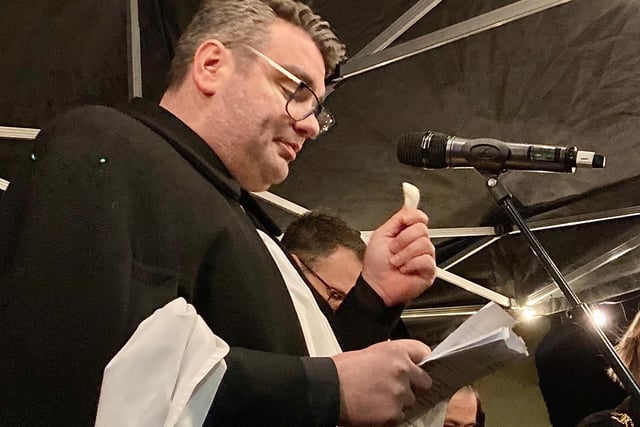The ‘scourge’ of modern slavery and exploitation of vulnerable workers around the world, was highlighted by some speakers.
And a former police officer who was involved in the 2004 tragedy and investigation said he had not returned to the seafront area for 20 years – until the night of the ceremony.
A retired Lancashire Police sergeant at the ceremony, Andy Stuttard, was the first policeman to arrive at Morecambe seafront when the 2004 incident unfolded, it is understood.
He said: “I have never been back here since that night in 2004. That tells you the impact it had on me. I served in the police for 32 years. I’d seen all sorts of things but the Morecambe tragedy was off the scale.
“When I arrived that night, everything started to escalate. We had to seal-off the area as a scene of investigation. It was essential to manage the scene as best we could. Then the bodies started to be recovered. It went from one body to four to eight to 12. And on it went. We were there a long time. Hour after hour. When I see old TV news footage from 2004, I can see myself there. It was a horrific event.”
As darkness fell and in windy conditions, the Mayor of Lancaster, community representatives, the Bishop of Blackburn, the Rector of Morecambe Rev Chris Karawiec, emergency service staff and others gathered at the RNLI lifeboat station and a nearby memorial to the Chinese cocklers.
Also involved was Kim Leong, chairman of Lancaster and Morecambe Bay Chinese Community Association and also Lancaster City Council.
There were speeches, singing of the hymn Amazing Graze during which candles were lit, a Bible reading, a reading of the victims’ names, a period of silence and a vigil to express sorrow, anger and opposition to people trapped in modern slavery.
The cocklers’ deaths had ‘shed a light’ onto slavery and abuse of workers, church leaders said.
For a few minutes, people on the promenade were asked to turn around with candles and face the dark sea.
They were also offered a cockle shell as a reminder of the ongoing fight against modern slavery and of those who died that day.
Kim Leong, who first lived in Heysham and now Lancaster, said: “Tonight was very poignant. It was so sad to read the names of all those people who died, who I never met. They were being exploited and did not know about the tides of Morecambe Bay.
“I remember the night in 2004, watching the news on TV and seeing a helicopter out above Morecambe Bay. It was pitch dark. It was terrible.”
He said the local Chinese association was formed after the 2004 tragedy and a Chinese music group called the Long Walk Ensemble.
They have also done events with the More Music organisation.
James Liu, who lives in Morecambe, is vice-chairman of the Chinese community association.
Mr Liu said: “We had support from the Prince’s Trust with the memorial plaque. It features the names of all those who died, a beautiful poem and the symbolic Chinese crane bird. The poem is full of compassion. It’s first line refers to the dawn and dusk and through the night. It is very moving.”
Speaking after the ceremony, Martin Plimmer, a former Lancashire Police officer who now works for the Gangmasters and Labour Abuse Authority said: “Our agency was set up after the Morecambe tragedy. It was an important response at the time to put in new legislation and create an agency specialising in these issues, We regulate people in the shellfish, agriculture and food processing industries to make sure the Morecambe Bay tragedy never happens again.
“I do think the industry has changed over the past 20 years. But we are not complacent. I’m the national investigations lead and oversee any investigations into breaches.
“I was involved with the Lancashire Police Morecambe disaster investigation for six months. There was a big police team on it. Police had to identify who the dead people were using DNA links. We worked with police in China and Interpol. A Lancashire Police team travelled to China and took DNA samples from families there to match with the bodies. We found their families and identified all 23 from a population of over one billion people in China.”

1. Candlelit vigil and memorial
Candles at the memorial event and cockle shells which were handed out for people to take home. Photo: Robbie MacDonald

2. Cocklers candlelit vigil and service
People hold candles at the vigil and service in Morecambe to mark the 20th anniversary of the Morecambe Bay cockling disaster. Photo: Robbie MacDonald LDRS

3. Candlelit vigil and memorial
The Bishop of Blackburn Philip North at the candlelit vigil and memorial. Photo: Robbie MacDonald LDRS

4. Candlelit vigil and memorial
Rev Chris Krawiec, Rector of Morecambe Parish Church at the memorial service for the cocklers. Photo: Robbie MacDonald LDRS